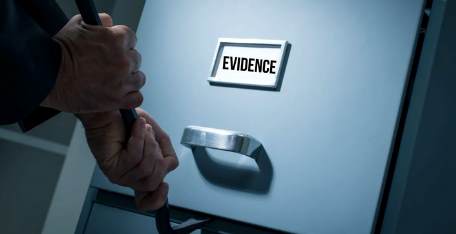Facing Tampering with Evidence Charges in San Antonio, Texas? Here’s What You Need to Know
When you face a tampering with evidence charge in Texas, you are up against one of the most serious and strategically prosecuted felonies in the state’s criminal code.
Unlike other charges, a tampering accusation alleges a deliberate act of dishonesty to obstruct justice—a powerful narrative that prosecutors use to influence juries and secure severe convictions. At Barton & Associates, our team of former prosecutors and board-certified criminal defense attorneys knows that these charges are often fueled by panic, misunderstanding, or a misguided attempt to manage a bad situation. Regardless of the circumstances, the consequences of a conviction are catastrophic, including significant prison time and a permanent felony record. Your immediate response and choice of legal representation are the most critical decisions you will make.
What Is Tampering with Evidence in Texas?
Under Texas Penal Code Section 37.09, the official charge is “tampering with or fabricating physical evidence”. This statute broadly criminalizes several types of actions:
- Altering, destroying, or concealing evidence: This occurs when a person knowingly alters, destroys, or conceals any record, document, or thing with the intent to impair its truthfulness, availability, or legibility as evidence in an investigation or official proceeding.
- Creating or using false evidence: A person commits an offense by making, presenting, or using any false record or document, knowing it is fake, with the intent to affect the course or outcome of an investigation.
- Failing to report a corpse: It is also an offense to observe a human corpse under circumstances where a reasonable person would believe a crime occurred, know that law enforcement is not aware of it, and willfully fail to report the body’s location.
The intent behind your actions is the linchpin of the charge. The prosecution must prove you knowingly engaged in the conduct and specifically intended to obstruct an investigation.
Common Actions That Lead to Tampering Charges
People are often shocked to learn that seemingly minor or panicked actions can trigger a felony tampering charge. These acts frequently arise from other investigations, making a difficult legal situation much worse.
Common scenarios include:
- During a Traffic Stop or Arrest: Swallowing or flushing illegal drugs, throwing a weapon or contraband from a vehicle, refusing a lawful breath test to prevent evidence collection.
- Domestic or Assault Cases: Deleting text messages, call logs, or social media communications; cleaning up a physical altercation scene; hiding a weapon.
- White-Collar or Fraud Investigations: Shredding documents, altering financial records, erasing computer files, or ordering the removal of business records after learning of an investigation.
- Homicide or Serious Injury Cases: Moving or concealing a body, disposing of bloody clothing, or cleaning a crime scene.
It is essential to understand that you can be charged even if you are never convicted of the underlying crime. Prosecutors treat tampering as a standalone, serious felony because it strikes at the heart of the justice system.
Severe Penalties and Long-Term Consequences of a Conviction
The stakes in a tampering case are incredibly high. The penalties vary based on the nature of the evidence involved.
- Third-Degree Felony (Most Common): Tampering with evidence is typically a third-degree felony. A conviction can result in 2 to 10 years in state prison and a fine of up to $10,000.
- Second-Degree Felony: If the tampering involves a human corpse, the charge is elevated to a second-degree felony, punishable by 2 to 20 years in prison and up to a $10,000 fine.
- Class A Misdemeanor: The specific act of failing to report a discovered corpse is a Class A misdemeanor, carrying up to 1 year in jail and a $4,000 fine.
Beyond prison walls, a felony conviction for a crime of dishonesty like evidence tampering creates a permanent criminal record that can destroy your future. You may face:
- Loss of employment and professional licenses.
- Inability to secure housing or loans.
- Loss of the right to vote, serve on a jury, and possess firearms.
- Severe immigration consequences, including deportation for non-citizens.
Proven Defense Strategies for Tampering Charges
At Barton & Associates, our defense is built on challenging the very foundation of the prosecution’s case. The state bears the burden of proving every legal element beyond a reasonable doubt, and we exploit weaknesses in their theory. Our strategies include:
- Challenging Intent: The prosecution must prove you acted with the specific intent to impair an investigation. We present evidence that your actions were accidental, had a legitimate purpose, or were done without knowledge that an investigation was pending. For example, discarding an item you did not know was evidence is not a crime.
- Lack of Knowledge: A conviction requires proof that you knew an investigation or proceeding was underway. We meticulously analyze the timeline to show you were unaware authorities were involved, which negates a key element of the charge.
- Illegal Search and Seizure: If the police discovered evidence of tampering through an unconstitutional stop or search, we file a motion to suppress. If successful, the illegally obtained evidence is thrown out, often forcing the state to dismiss the case.
- Breaking the Chain of Custody: We scrutinize how law enforcement handled the alleged evidence. Failures in proper procedure for collecting, storing, or transferring evidence can cast doubt on its integrity and lead to its exclusion at trial.
Each case is unique, and a seasoned attorney will determine the most effective combination of strategies based on the specific facts.
The Critical First Steps: What to Do If You Are Under Investigation
Time is your most valuable asset and greatest enemy in a tampering case. Prosecutors and police begin building their narrative from the moment they suspect you. Your actions in the first 48 hours can dictate the entire direction of your case.
- Invoke Your Right to Remain Silent. Immediately. This is the single most important action you can take. Do not try to explain, justify, or talk your way out of the situation with law enforcement. Anything you say will be used against you to establish your knowledge and intent. Politely and firmly state: “I am invoking my right to remain silent and I will not answer questions without my attorney present.”
- Do Not Consent to Any Searches. If officers ask to search your phone, computer, vehicle, or home, you have the right to refuse unless they have a warrant. Do not help them gather evidence.
- Contact a Defense Attorney Before Speaking to Anyone. Do not discuss the incident with friends, family, or cellmates. These conversations are not protected. Your first and only call should be to a criminal defense lawyer.
- Preserve All Potential Evidence. If you have any information, documents, or messages that relate to the incident, inform your attorney. They will advise you on how to legally preserve it.
Why You Need Barton & Associates on Your Side
Fighting a tampering charge requires more than just a lawyer; it demands a strategic advocate with specific experience in these complex, high-stakes cases.
- Former Prosecutorial Insight: Our team includes attorneys who have been on the other side. We know how the state builds tampering cases, what evidence they prioritize, and where their arguments are most vulnerable. This insider perspective is invaluable.
- Aggressive, Early Intervention: We act with urgency to secure evidence, communicate with prosecutors before formal charges are filed, and begin constructing your defense narrative from day one. Early action can lead to reduced charges or even prevent an indictment.
- Trial-Tested Litigators: Prosecutors know we are fully prepared to take every case to trial. This reputation gives us significant leverage in negotiations and ensures we build the strongest possible defense for court.
- Local Expertise and 24/7 Availability: With offices in San Antonio, Austin, and Corpus Christi, we have deep relationships with courts across Texas. We understand local judges and prosecutors, and we are available around the clock because legal emergencies don’t keep business hours.
Your Future Hangs in the Balance. Contact Us Now.
A tampering with evidence charge is a legal crisis that will not resolve itself. The state will aggressively pursue a conviction that could strip you of your freedom for years and alter the course of your life permanently. Hoping for the best or attempting to navigate this alone are strategies for disaster.
Do not wait. Do not speak to investigators. Protect your future now.
Contact Barton & Associates immediately at 210-500-0000 for a confidential, no-obligation case evaluation. We will listen to your situation, explain your rights in clear terms, and begin the urgent work of building your defense.
Main Category: Criminal Defense
Practice Area Category: Felony Offenses
Barton & Associates, Attorneys at Law
115 Camaron St, San Antonio, TX 78205
Office: 210-500-0000









